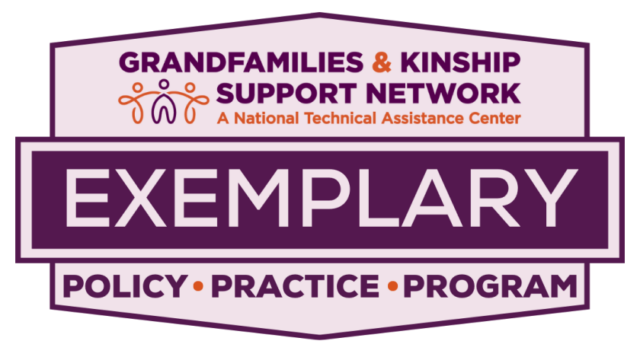Tip Sheet
Supporting Kinship/Grandfamilies When Parents Have Substance Use Disorders
Download This Resource

A Network Monthly Resource: August 2024
The Numbers
Parental substance use disorders1 are a frequent factor in foster care placements. Available data, which applies to children in foster care only, suggests that 4 in 10 placements include documented parental alcohol and/or drug use as a condition associated with the removal of the children. For babies under one year of age, that number increases to 5 in 10. In 20 states, that number is at least 6 in 10. Research indicates that child welfare cases of substance use are typically undercounted for a variety of reasons, including the timing of the identification of substance use and the way case workers document substance use. For instance, alcohol use during pregnancy may not be apparent immediately because children with a Fetal Alcohol Spectrum Disorder (FASD) are often not diagnosed until they reach school age or are misdiagnosed.
While not all families affected by substance use are in need of child welfare intervention and most kinship/grandfamilies are not involved in the child welfare system, early identification and connection to services to mitigate the potential effects of parental substance use can be enormously helpful. Regardless of child welfare involvement, families can benefit from a clinical substance use disorder assessment of the parent and the development of an appropriate treatment plan, completed as part of a comprehensive assessment of the entire family’s strengths and needs. For more information, see Building Collaborative Capacity Series: How to Develop Cross Systems Teams and Implement Collaborative Practices.
Effect on Families
Recovering from a substance use disorder is not like recovering from a broken leg—it’s never “one and done.” Like other chronic disorders, relapses may happen, but recovery is possible. One grandmother describes dealing with her daughter’s substance use as “layer upon layer of emotion, anxiety, stress, and trying to comprehend.” She says her heart is broken for her grandchildren.
- If a healthcare provider recognizes prenatal substance exposure, including neonatal abstinence syndrome (NAS) or possible Fetal Alcohol Spectrum Disorder (FASD) in an infant, the Child Abuse Prevention and Treatment Act (CAPTA) requires the creation of a Plan of Safe Care that “addresses the health and substance use disorder treatment needs of the infant and affected family or caregiver.” This plan can be made in partnership with parents, caregivers, and other family members before the child is born. It can be implemented to ensure that the family is connected to relevant services, such as early intervention services for the infant, substance use disorder treatment and other services for the parents, education services for parents and caregivers who are caring for an infant with prenatal substance exposure, special education services as the infant develops, and services to support the parent-child-kin caregiver triad.
- Parental substance use is an adverse childhood experience (ACE) and can co-exist in a home environment that includes other ACEs, such as instability due to parental incapacitation or absence. These traumatic events can cause long-term socio-emotional and/or developmental health issues, as can prenatal exposure to alcohol and/or drugs. The potential health effects, physical and mental/behavioral, of parental substance use may not appear right away. Kin caregivers can help by asking a pediatrician to screen for ACEs and providing a thorough family history, including any substance use. Kin caregivers can also request an early intervention or special education evaluation.
- Kinship/grandfamilies often struggle with whether to seek a legal relationship with the child, trying to balance hope for a parent’s recovery with concerns for the ongoing safety of the child. Kin caregivers, whether inside or outside the child welfare system, may want to consider permanent options such as guardianship or adoption.
Strategies for Caregivers
Kin caregivers are a positive force in helping children deal with the challenges of a parent’s substance use. Caregivers can help children heal and thrive when they:
- Know that the effects of substance use disorders on the brain can decrease a parent’s ability to care for their child or affect their ability to understand the effects on their children. Help children understand that substance use disorders are a brain disorder – not a moral failing or character flaw – and that, with treatment, recovery is possible.
- Recognize that children feel connected and loyal to their parents and often blame themselves if parents are not involved in their day-to-day lives. Honor children’s innate desire to be with their parents and facilitate family time to promote parent-child attachment and relationship-building. Research shows that children who visit frequently with parents while in foster care placement typically have higher rates of well-being, including mental health.
- Set realistic expectations and boundaries for the parent’s visits – for example, no showing up drunk or high, no yelling or threats of violence, no arrivals after bedtime.
- Act as a buffer, acknowledging and validating a child’s disappointment in a parent’s behavior without openly criticizing the parent.
- Be the person children can count on. Research shows that the stability and consistency adults offer can make a difference in how children respond to early adverse events. Positive childhood experiences (PCEs) – including strong connections and relationships with kin caregivers, other family members, and others – counteract ACEs. Service providers can help families identify and develop PCEs.
For more ways to support kin caregivers, see Navigating Family Dynamics in Kinship Families: Tips for Service Providers and Helping Caregivers Address a Parent’s Absence.
Resources
Families struggle with the stigma of substance use disorders. One grandmother notes that, unlike families dealing with a death or physical illness, “It’s not like neighbors are bringing casseroles to your door.” Kin caregivers dealing with a parent’s substance use disorder are in need of support and often don’t know where to turn. Families can contact the following for information and referrals:
- The federal Substance Abuse and Mental Health Services Administration’s 24-hour helpline: 1-800-662-HELP (4357)
- The National Alliance on Mental Illness (NAMI) and Al-Anon
- Virtual and online support groups, like Parents of Addicted Loved ones (PAL)
- The Hazelden Betty Ford Foundation
- FASD United, which is national, and Illuminate Colorado FASD Support, which is a good state-based example
Peer support is very powerful. If your organization can provide it, offer a support group tailored to kin caregivers, where it feels safe to speak honestly about the dual challenges of addressing substance use and raising a family member’s children.
- “Substance use disorders” is the preferred terminology when describing parental substance use. The terminology seeks to combat stigma and serves as a reminder that substance use disorders are a medical condition and, with appropriate treatment, recovery is possible. This document uses “substance use disorders” and “substance use” when appropriate. ↩︎


